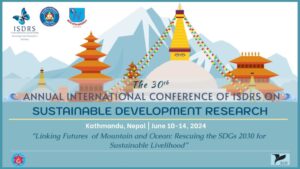Goals And Objectives
The United Nations’ Sustainable Development Goals has emphasized the importance of gender equality and women’s empowerment as integral for achieving all other development goals. Women’s leadership is seen as a critical driver for advancing these goals and ensuring sustainable progress in various sectors.
Women in South Asia, particularly in developing countries, are often firsthand resource users, especially in sectors such as agriculture, energy, healthcare, and natural resources management and tend to build stronger connections with the environment. However, men tend to hold leadership roles in these sectors, which can limit women’s participation in decision-making processes and access to resources. Women are also disproportionately impacted by climate change as they work in areas particularly exposed to the negative effects of climate change, such as agriculture, water, and forestry but are also often underrepresented in climate-related decision-making processes. This disparity is due to various factors, including gender inequality, cultural norms, and lack of opportunities for women to advance into leadership positions.
Women leaders are more likely to support climate action and sustainability, and they can bring unique perspectives and skills to climate leadership roles. Meaningful participation of women in politics, institutions and public life is the catalyst for that transformational change, which benefits society as a whole. Promoting women’s leadership in development requires addressing barriers to their participation, providing targeted training and support, and creating inclusive environments to advance women leaders in various sectors.
In summary, the rationale for women’s leadership in development is deeply rooted in the principles of equality, diversity, community well-being, and the commitment of sustainable and inclusive development. They also serve as role models and inspire other women to pursue leadership roles, breaking down gender stereotypes and contributing to greater gender equality in society. Promoting women’s leadership is closely tied to the broader goal of achieving gender equality and incorporating women into leadership roles is essential for achieving all-inclusive and sustainable development.
In this session, we are looking for contributions related to the women’s leadership in development.
Length And Content Of The Proposed Abstract To The Track
Each proposed abstract (in connection to one of the areas pointed out above) within 300 and 500 words (including everything)
- shall be best organized (without headlines) along usual structures (e.g., intro/method/findings or results/ discussion/conclusions)
- does not need to, but can include references
- shall provide in a final section
a. to which SDG(s) and SDG-target(s) their proposed abstract especially relate to (e.g. “SDG+Target: 14.1.”).
b. a brief indication of how the proposed contribution relates to the topic of the Conference (Linking Futures of Mountain and Ocean: Rescuing the SDGs 2030 for Sustainable Livelihood)
Abstracts that do not outline points 3.a.) AND 3.b.) might be considered less relevant in the Review.
Potential Publication Channels
With regard to potential publications, depending on the number and quality of contributions, diverse publication opportunities will be envisaged.
Submission
Keep up to date with developments of ISDRS 2024 Tracks here
“Linking Futures of Mountain and Ocean: Rescuing the SDGs 2030 for Sustainable Livelihood“
Who are we
Leena Gurung, Department of Development Education, Kathmandu University School of Education (KUSOED), Nepal.
linaphd2017@gmail.com
Nalini Subba Chhetri, School for the Future of Innovation in Society, Arizona State University, US.
Nalini.Chhetri@asu.edu
